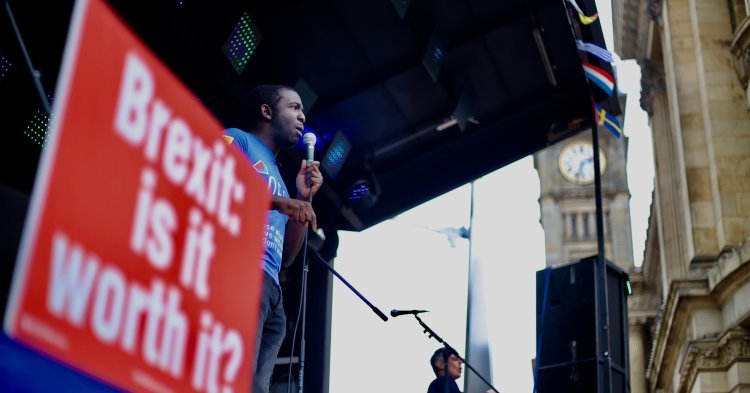So imagine if we had a People’s Vote two weeks from now. For a start, this would quench the population’s thirst to slate the government for its botched negotiations (85% of us think Brexit is a “mess”, according to an Evening Standard poll), hold it to account for the (albeit impossible) promises made in 2016 (75% of Britain thinks it has failed to deliver on these, according to the same survey) and restore some faith in our “democratic” system.
For a prime minister who has proven surprisingly keen to adopt populist rhetoric of complaining of Brussels’ lack of flexibility, May seems remarkably ready to keep waving her questionable mandate in everyone’s faces and insist that the “will of the people” (bucket, please) can’t change. “Take back control (of our politicians)” is the slogan that jumps to mind.
Polls show that, were we to have a People’s Vote, the UK would vote to remain. Admittedly, polls have not behaved predictably recently, but the margin is clear and growing, and Leave has no major arguments yet to be discredited.
So imagine if we had a People’s Vote. After a decision to remain, what would happen next?
1) Chaos would swallow Theresa May, whose time left in the top job is already looking about as abundant as originality in her speeches. She would scuttle out of Downing Street never to be seen again, and the DUP would pull the plug on the crumbling government. An immediate general election would see the Conservatives’ power deflated and the public would reluctantly lend their faith to Jeremy Corbyn.
2) A Corbyn leadership would be a turning point in British politics. Weak as he has been in opposition, he has the potential to begin targeting some of the widespread discontent widely cited in the “left behind” explanations of the Leave vote, unless a leadership challenge could see him ousted by a candidate with a more decisive position on Brexit.
There would be an immediate end to austerity (promised by the Tories but I’ll believe that when I see it), a lurch leftwards and a fresh approach to governance the United Kingdom. A recent UN report provides stinging criticism of the levels of poverty (particularly among children, women and the disabled) in the world’s fifth-largest economy. No one is pretending a Labour government would solve all our problems, and the gulf between Remain and Leave camps would appear as unbreachable as ever. But it would start to tackle the causes and not the symptoms of Britain’s runaway inequality and disillusion and thereby provide a basis for patching together our broken conversation in our broken society.
3) The beginning of a change in attitudes towards immigration. The 23% jump in racist hate crime in the 11 months following the referendum was like exposing creepy crawlies from under a rock, and a remain result of a People’s Vote would almost certainly trigger further bitter lashes.
But there have been ripples of outrage from the despicable language used by politicians and the press to describe EU migrants. Theresa May might think that accusing EU citizens of cheating at the British national sport of queuing would be the best way to get the public on her side, but the openly discriminatory discourse regarding human beings who came to this country legally exercising the rights of their European citizenship shows to what extent anti-immigrant sentiment has poisoned mainstream politics. Positive change is overdue.
At least for those who can’t be convinced by the justifications of European citizenship, cultural richness and individual freedom, we’re now armed with numbers: EU migrants contribute on average £2,300 a year more than UK citizens to the economy and they make up 10% of our doctors and 7% of our nurses. Two and half years of intense discussion on the free movement of people has busted a few stereotypes and forced us to reflect on what we really mean by the loaded, suspicious-sounding term “immigrant”. If we get through the darkest hour, I see the glimmers of a more open, tolerant, informed Britain ahead.
4) “Imagine if,” Femi Oluwole, co-founder of Our Future Our Choice, enthused when I met him, “we were putting all this energy and money that we’re currently wasting on Brexit into revitalising the NHS instead.” The NHS has become a hotly contested battleground coveted and claimed by both sides, but few deny it’s in need of a little TLC [1]. Improving our health care would be something the UK could actually unite behind and I drool over the irony of investing more into the service thanks to a non-Brexit dividend.
5) A rush of enthusiasm for foreign languages and the most “European” generation of young people ever seen in Britain. Sometimes, you don’t know what you have until someone takes it away from you. Imagine if the 16-year-olds who are growing up surrounded by this debate, being told that unlike those ten years older, they will be denied the rights and privileges their own government is currently fighting to take away from them, were suddenly allowed to keep these rights after all.
Imagine that, instead of a further reduction in interest in foreign languages caused by restricted opportunities on the continent, young people have an ignited incentive to work on their verbs and vocabulary and more chances to engage with people from other cultures practically on their doorstep. Imagine the gratitude of the young generation, who overwhelmingly want to remain, if a European identity became a reality for them once more. Imagine all that creativity and talent pouring into the reconstruction of British society within a stronger European Union.
The case for a People’s Vote is indisputable. Only those capable of shutting their eyes to the bloated lies, the ongoing criminal investigations, the shift in public opinion and the long-term good of the United Kingdom and the Continent can still complain that it would undermine democracy. British society would be more bitterly divided than ever, but we would have a better chance of tackling the roots of those divisions.
A People’s Vote would not be a quick fix. We would still have a country, a society, an identity and a faith in politics to rebuild. But it would be a pretty good start.
But I repeat: please, no buses.







Follow the comments: |
|
